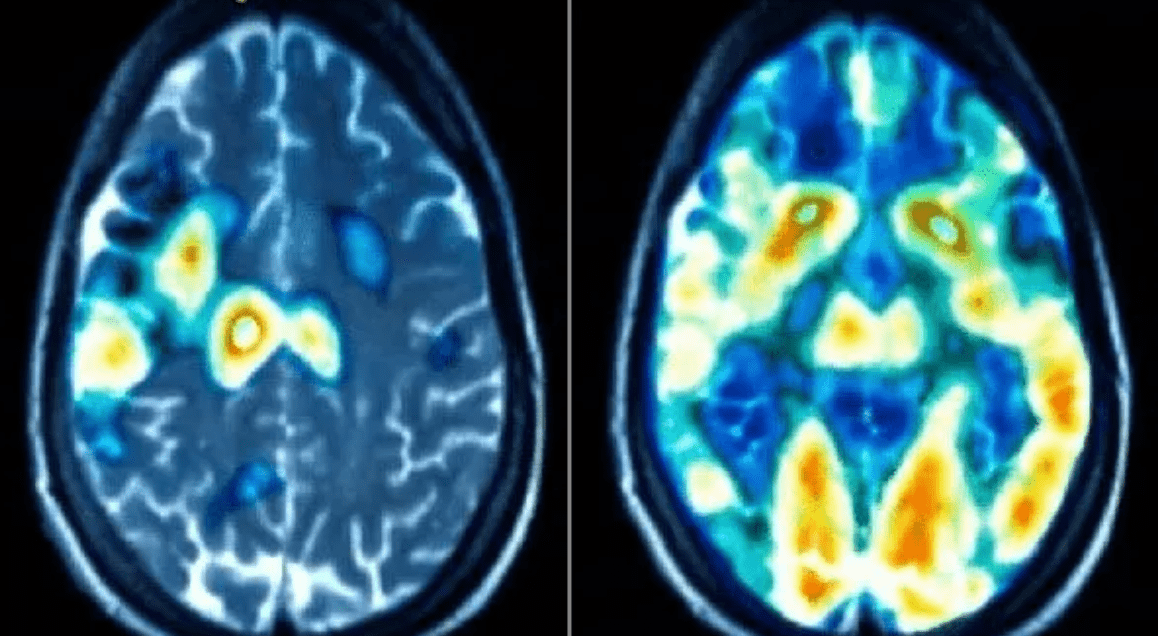Brain chemistry is an important factor in treating depression.
True
What does stigma mean?
A set of negative and often unfair beliefs that a society or group of people have about something leading to discrimination.
Second (anxiety is first).
Which brain is experiencing depression?

Left one.
This type of depression has an effect on the person during certain times of the year.
Seasonal Affective Depression
People experiencing depression tend to have a better memory.
False: Depression affects how our brain handles memory, focus and attention.
"It's a sign of weakness"
About ___ of adolescents aged 12-17 experience major depression
20%
Name two symptoms of depression.
- Persistent sadness or hopelessness
- Loss of interest or pleasure in activities
- Changes in appetite or sleep patterns
- Difficulty concentrating or making decisions
- Feelings of worthlessness or guilt
- Irritability/low patience
Name two causes of depression.
Genetics, Brain chemistry imbalances, Life events (e.g., trauma, loss, stress), Psychological and life style factors (e.g., negative thinking patterns, coping mechanisms, poor self-care)
Feeling alone in a crowded room is often associated with depression.
True. Isolation and guilt often show up when we are experiencing depression.
“He has everything. He is smart and has friends and supportive parents. What does he have to be depressed about?”
Depression is a biologically based illness. It can be triggered by stressors, though, and social supports can be protective.
Boys and AMABs are (less or more) likely to experience depression than girls and AFABs.
Less: Statistics show that AFABs are twice as likely to experience depression than AMABs.
This image represents the emotion that can be the most misunderstood symptom of depression, especially in teens.

Irritability
Depression often "co-occurs" with other challenges. Name 2 please.
Anxiety, trauma, substance use, ADHD, OCD, Eating Disorders
Depression does not impact brain development.
False. Depression impacts established neuropathways and brain growth.
“She’s just lazy. If she just tried harder…”
Depression can affect sleep, energy level and motivation, to name a few associated symptoms. You can engage in positive activities to help alleviate symptoms however "mind over matter" is not a helpful way to overcome depression.
____ of teenagers experiencing depression did not receive any treatment.
56.1%
Name two symptoms of depression.
- Persistent sadness or hopelessness
- Loss of interest or pleasure in activities
- Changes in appetite or sleep patterns
- Difficulty concentrating or making decisions
- Feelings of worthlessness or guilt
- Irritability/low patience
This is the most common form of depression and it can happen one single time or is reoccurring in cycles.
Major Depressive Disorder
Depression can be more treatable with youth due to neuroplasticity.
True! Your brain does not fully develop until 25 years old, meaning your brain is very moldable as it develops (meaning it's making new connections, learning and adapting to new experiences).
What is internalized stigma?
Internalized stigma is what happens when we start to believe the negative attitudes, beliefs, and practices and it becomes part of how we see ourselves.
Name a factor that puts someone at a higher risk for experiencing depression.
Socioeconomic status, ethnicity, LGBTQ+, chronic health conditions.
Name one neurotransmitter that contributes to depression when low.
Dopamine (positive feelings associated with reward or reinforcement that motivate us to continue with a task or activity)
Serotonin (feel good" chemical that helps regulate your mood, sleep and appetite)
Norepinephrine (Influences mood, alertness, and attention. Associated with flight or fight response)
Anxiety